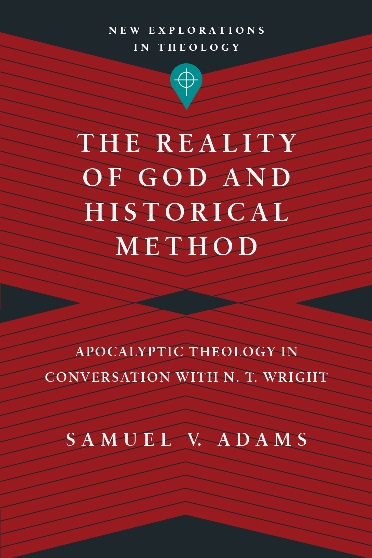Samuel Adams: The Reality of God and Historical Method
 Samuel V. Adams, The Reality of God and Historical Method: Apocalyptic Theology in Conversation with N.T. Wright, New Explorations in Theology (Downers Grove, IL: InterVarsity Press, 2015), 291 pages.
Samuel V. Adams, The Reality of God and Historical Method: Apocalyptic Theology in Conversation with N.T. Wright, New Explorations in Theology (Downers Grove, IL: InterVarsity Press, 2015), 291 pages.
In this intriguing book, Samuel Adams tries to figure out what it means to do history about the Bible if we assume that God actually exists. The proposition is an interesting and important one: biblical studies has a legacy of being forced to decide whether to approach its object of study either theologically or historically, with the implication that historical approaches are not intended to reckon with the reality of God. In this revision of his PhD thesis, completed under the supervision of Alan Torrance at the University of St. Andrews, Adams picks at the historical method of popular biblical scholar N.T. Wright to ask whether his account of history can cope with a God who is more than simply an element in the worldviews of the biblical authors. Ultimately, Adams believes that Wright’s Critical Realist approach to history is insufficient when applied to knowing God as it does not take account of the implications of making God the object of knowledge. Having diagnosed the problem Adams sets out to offer a solution, situating himself as a theologian who is attempting to resolve a problem built into Wright’s method by drawing on the resources of apocalyptic theology (181-2). This is a bold claim, considering the status of Wright.
Adams begins by describing Wright’s approach to history. He is particularly interested in what the former Bishop of Durham has to say about how we come to know things. Wright argues that knowledge is gained when we come into contact with things outside ourselves, and Adams rightly diagnoses here the epistemological underpinning of Wright’s project. Although Adams does not dispute that Wright’s approach helps him understand what the biblical writers intended to say, he does not think it can address the ‘reality’ which they were writing about: it addresses their worldviews, rather than the subject matter of the text.
Following Torrance, Adams sees this as ‘God-talk-talk’ (talk about what people have said about God) rather than ‘God-talk’ (talk about God). For example, Adams accepts that Wright can understand the apocalyptic worldview of the writer of revelation, but argues that this is completely different from understanding the revelation (‘apocalypse’) of God in Christ. Although Wright wants to move from the history of Jesus to talk about his status as Christ, Adams argues that his theological comments are actually only comments about the worldviews of the biblical authors (56) and never quite manage to become truly theological statements. Wright describes descriptions of God, not God – despite his claims to the contrary.
Here, Adams comes to his main criticism: Wright’s method is naturalist because “the knowledge of God is treated no differently than the knowledge of reality external to the knower in general” (74-5). Rather than allowing God – as a unique object of knowledge – to shape the way he is known, Adams sees Wright as imposing an inappropriate way of knowing onto God. Because of the importance of ‘contact’ to Wright’s own account of knowledge, Adams goes on to argue that this is actually self-contradictory: Wright has previously argued that we come to know things through contact with external reality, so surely such a different reality should be known differently?
Category: In Depth, Spring 2016


